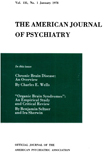Interactional Issues as Determinants of Alcoholism
Abstract
The authors describe the patterns of interactional behavior of three familial pairs of chronic alcoholics before, during, and after a 14-day period of experimentally induced intoxication. Their observations have led them to propose that alcoholic behavior can best be understood in the context of how it contributes to the functioning of an ongoing system. Each of the three pairs described split up at the conclusion of the study; the authors speculate that the rigidity of their drinking systems made them particularly susceptible to the "therapeutic" interventions inherent in the study conditions.
Access content
To read the fulltext, please use one of the options below to sign in or purchase access.- Personal login
- Institutional Login
- Sign in via OpenAthens
- Register for access
-
Please login/register if you wish to pair your device and check access availability.
Not a subscriber?
PsychiatryOnline subscription options offer access to the DSM-5 library, books, journals, CME, and patient resources. This all-in-one virtual library provides psychiatrists and mental health professionals with key resources for diagnosis, treatment, research, and professional development.
Need more help? PsychiatryOnline Customer Service may be reached by emailing [email protected] or by calling 800-368-5777 (in the U.S.) or 703-907-7322 (outside the U.S.).



